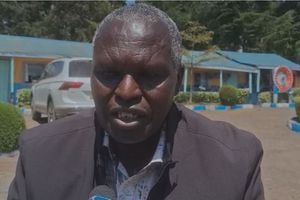Lessons from two women on the healing power of owning one’s story

Two women share their stories.
What you need to know:
- My friend Rachel Omkaka believes that there’s no way to uplift and empower others unless you are at peace with yourself and your story.
- Gisèle Pélicot, a stranger from France, appeared in court to face 51 men accused of sexually assaulting her while she was drugged unconscious.
“I hope when you come home to yourself, there are flowers lining the front porch that were left from all the women you were before” are beautiful lines from a poem by Maia that say everything women need to know about self-acceptance and love, healing and honouring one’s past self.
These themes came to mind recently when I listened to the stories of two women from opposite ends of the world: Rachel Ombaka, a dear friend from Kenya, and Gisèle Pélicot, a stranger from France.
In a podcast episode, titled From Math Prodigy to Advocacy: Fighting for Women's Rights, hosted by my mentor Edna Thiong'o, Rachel, a journalist who describes herself as a woman’s woman who speaks up about things that society would rather keep quiet about, let us in on her mother’s story of escaping physical and emotional violence from her father.
In 2019, Rachel's mother sent a distressing message and video to the family WhatsApp group, saying she was being attacked and had locked herself in the toilet, bleeding from her head.
Rachel, who was in South Africa at the time, panicked as she couldn’t reach anyone, including her mother or her children, who were with her. Eventually, someone rescued her mother, took her to hospital, and later brought her to Nairobi.
Within a week, the family pooled money for a plane ticket, and her mother left Kenya to stay with Rachel's sister in the US, seeking solace and escaping the trauma. She has since created a new life for herself there.
“I know it took her 39 years to leave, but the fact of the matter is she left,” Rachel reflects, adding that the day her mother left marked her own turning point towards becoming an advocate for women’s rights.
Rachel believes that there’s no way to uplift and empower others unless you are at peace with yourself and your story.
Gisèle Pélicot’s story is even more horrific. The 72-year-old woman appeared in court to face 51 men accused of sexually assaulting her while she was drugged unconscious—on her husband’s orders—over the course of 10 years.
In a powerful act of owning her story, Gisèle waived her anonymity during the trial. Her reasoning was simple. The BBC reported that she wanted to shift the "shame" back onto the accused and was doing it for "every woman who’s been drugged without knowing it… so that no woman has to suffer."
Her actions are nothing short of heroic, given the self‐blame, shame and social isolation that automatically accompanies rape. By owning her story, and showing her face, Gisèle is doing her part in redirecting the stigma of sexual violence from victim to perpetrator.
Rachel and Gisèle may live worlds apart, but their stories, though traumatic, show us what the path to healing may look like.
The writer comments on social and gender topics (@FaithOneya; [email protected]).





